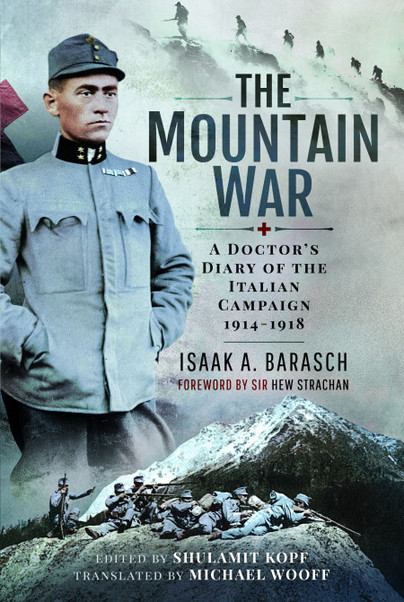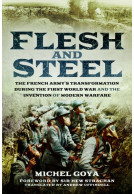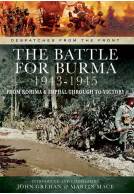The Mountain War (Hardback)
A Doctor's Diary of the Italian Campaign 1914-1918
Imprint: Pen & Sword Military
Pages: 224
ISBN: 9781399093101
Published: 22nd November 2021
(click here for international delivery rates)
Order within the next 4 hours, 7 minutes to get your order processed the next working day!
Need a currency converter? Check XE.com for live rates
| Other formats available - Buy the Hardback and get the eBook for £1.99! | Price |
|---|---|
| The Mountain War ePub (25.1 MB) Add to Basket | £6.99 |
The diary Dr Isaak Barasch kept while serving in the Austro-Hungarian army on the Italian front during the First World War gives the reader a remarkable insight into the conflict and into the man himself. Few personal accounts of service on the Italian front have been published in English and diaries from the Habsburg side are rarer still, so his writing is exceptional.
He doesn’t record military actions and manoeuvres in detail, but concentrates on his own reflections and feelings as he coped with the sick and wounded on the front line. He is often angry with the army and the war, but never expresses jingoistic hatred of the enemy. His indignation is directed at superiors, at commanders and politicians who know nothing of the terror of the fighting. When reproached for being too sensitive and insufficiently hardened, he noted that his biggest worry was how to remain untouched – how to retain his humanity.
Eventually Barasch’s sensitivity – and his resistance to authority – led to his being placed in a psychiatric hospital, and he died during the influenza pandemic of 1918. But his unique account has been preserved and is now available in English for the first time. It is engrossing reading. It shows one man’s honest, often emotional response to the experience of the war on the Italian front and offers a very rare inside view of life in the Austro-Hungarian army.
Precious few books are available to American readers regarding the Italian Front in World War I, and even fewer are translated into English from the Austro-Hungarian side. Written by a Galacian doctor (now the Ukraine) stationed in the Dolomite mountains in 1916, "The Mountain War" fills a slot on your book shelf that few others can manage.
Indy Squadron Dispatch, Volume 34 No.5
Dr Barasch served nearly three years on the bloody Italian front and describes his experiences in detail in this newly published diary, which was preserved by his family for generations and is now available in English. Barasch does not hide his disdain for his military superiors, or the feeling of hopelessness that came over him after watching so many lives wasted in combat.
Barasch gives considerable detail on where he served and even the individual mountains that he climbed to work at various observation posts and artillery units. Many of these trails still exist in the Dolomites today and his detailed instructions make it possible to retrace his steps, either using trail maps online, or by actually going to Italy and eastern Europe today to re-live his experiences.
"The Mountain War" stands as a rare treat. Readable, unique and well illustrated, this is mandatory reading for World War I enthusiasts.
As featured in
The Western Front Association
WW 1 from the Austro-Hungarian front. The diary is supplemented with historical context for a unique perspective from the Dr. Barasch's emotions and insight. Just how the diary came to be published was like it was meant to be. The letter written by the Doctors grandniece (who published the book) adds an additional dimension. The book is well organized, and a must read during these times.
Jeffrey I. Rosenthal
With the war in Ukrainian, the fascinating diaries written 105 years ago become even more significant.
Jacob K, Amazon Review
Dr. Barasch has bared his soul with very little censorship so that I feel that I have gotten to know this intelligent, sensitive , insightful person.
He wrote: “that guns should be silent for once.
Mankind needs a rest”.
It was true then and it’s true today.
Right from the introductory letter, like a chain of love through time, I was in tears and knew I’d need a box of tissues by my side as I explored the thoughts and feelings of the inspiring Dr. Isaak Barasch from World War 1.
Irene Allison: co-author, Stay, Breathe with Me: The Gift of Compassionate Medicine
Dr. Barasch’s diary entries provide a veracity of time and place, a treasure trove for historians, but also an intricate examination of human foibles, the shadow side of men in the abuses and hierarchies of power, the spoils of war and profiteering. All of it pitted against those who suffer the most.
Insightful, compassionate, and wise, even when faced with the worst aspects of human nature, the good Doctor remains a giant among us. His courage and deep humanity leave a kind of spiritual roadmap for facing dark times.
And nothing could be more relevant today as our world faces ongoing wars, the horrific plight of refugees, and other human-caused depravities. In so many ways, we still seem stuck in the dark ages of the human soul. So how remarkable it is to read this testament of spiritual and personal strength and kindness, moments of beauty and awe despite terrible circumstances, glimpses of relatable human weaknesses, and tender struggles.
For me, the true gift of these diary entries is the gift of facing the darkest shadows while never losing sight of, and always embracing, our greatest humanity. The remarkable Dr. Barasch did just that.
Highly recommended.
Article: 'My Great-Uncle's WWI Diaries'
Jerusalem Report
Right from the introductory letter, like a chain of love through time, I was in tears and knew I’d need a box of tissues by my side as I explored the thoughts and feelings of the inspiring Dr. Isaak Barasch from World War 1.
Irene Allison, co-author of Stay, Breathe with Me: The Gift of Compassionate Medicine
Dr. Barasch’s diary entries provide a veracity of time and place, a treasure trove for historians, but also an intricate examination of human foibles, the shadow side of men in the abuses and hierarchies of power, the spoils of war and profiteering. All of it pitted against those who suffer the most.
Insightful, compassionate, and wise, even when faced with the worst aspects of human nature, the good Doctor remained a giant among us. His courage and deep humanity leave a kind of spiritual roadmap for facing dark times.
And nothing could be more relevant today as our world faces ongoing wars, the horrific plight of refugees, and other human-caused depravities. In so many ways, we still seem stuck in the dark ages of the human soul. So how remarkable it is to read this testament of spiritual and personal strength and kindness, moments of beauty and awe despite terrible circumstances, glimpses of relatable human weaknesses, and tender struggles.
For me, the true gift of these diary entries is the gift of facing the darkest shadows while never losing sight of, and always embracing, our greatest humanity. The remarkable Dr. Barasch did just that.
Highly recommended.
Truly, this was a illuminating read and a chance to see the front lines of war from one who has to repair the damage wrought by war. Barasch is a keen witness, detailing not only his experiences but those who suffered alongside him, be they civilian, animal or soldier.
NetGalley, J Gordon
Rating: 5 out of 5 stars
NetGalley, Patrick Carmen
This book does not hold back on detail nor information that helps to hold up the authors story. I have never read such a story! Of the many WW2 German Biographies and accounts I can say this is the most readable and detailed in a way that held my attention to the last. Wars filled with atrocities by both German and Soviet forces but try finding accounts that give much of the picture and not just snippets. The amount of death from that war is staggering IMO and this is the story that usually never gets told. If you are a history buff or just want to know the truth of war then IMO you cant go wrong reading this interesting and tragic tale.
Rating: 5 out of 5 stars
NetGalley, Janne Punski-Hoogervorst
''How beautifully the little birds are singing in the wood today. As if they didn't have a care in the world. They are twittering and trilling all around and do not allow themselves to be disturbed by all the ugliness that has been enacted in this vicinity for months now.''
Sometimes, you incidentally stumble upon a book that turns out to be both an incredible narration as well as a highly important work of history. ''The Mountain War'' is exactly that. The book holds the diary entries of army physician Isaak A. Barasch, a Jewish Hungarian stationed at the Italian fronts during the First World War between 1914 and 1918. It's a highly introspective, emotional, reflective and poetic work, that describes both the daily life practicalities of being an army doctor as well as the tragedy and sheer horror of being at the fronts of what would be known as one of the most horrific wars in human history.
''Hundreds of thousands of people have been torn to pieces here, crushed, blown up and mutilated. It is a great cemetery with its innumerable heroes' graves swarming everywhere with shamelessly exposed corpses. And all these things on this fair piece of ground were reveled before my very eyes in an instant. I was like someone intoxicated. I almost lost consciousness. I was as if rooted to the spot and could not stir from there. I stared and I stared. Then a shell exploded almost on top of me. I woke up.'' p.97
''Poor humanity for putting up with this! How cowardly you are! Where are all your freedom fighters? They're all phrasemongers, nothing more than that. You allow yourselves to be enslaved and led astray so easily.''
Dr. Barasch's war experience ends, maybe unsurprisingly so after reading his poignant descriptions of despair, trauma and loss of faith in the world, in a psychiatric hospital. His diary describes how depressed and humiliated he feels, being under constant care and with a total feeling of self-sacrifice. Unfortunately this is where his diary ends: he passed away at the young age of 33 of the Spanish flue during the epidemic in 1918. Two months after his death, the Hungarian empire which he served no longer existed.
It could be considered sheer luck, that dr. Barasch's entries have even survived to current day. His diaries were brought to the US by his sister in 1922: had they remained with the family in Poland, they would have been destroyed or lost during the war. The works have now been rediscovered and brought to publication by dr. Barasch's great-niece who discovered them after having been stored in a drawer for almost 100 years.
Many will be familiar with WWI diary entries, poetry or literary memoirs, such as the works from Sassoon, Remarck and Owen. Most of these works however describe the experiences of soldiers on the Western front, such as in the trenches in the fields of Flanders. Dr. Brasach's diary is unique in a way that it describes the other side of the battle: the front in the Italian mountains. In addition to the diary entries, the book provides sufficient and fascinating historical background information. These chapters, written by the British military historian Sir Hew Strachan, provided the crucial context to really appreciate the diary entries for their importance in our understanding of what really happened at the war fronts.
In conclusion, I would highly recommend this work to anyone interested in WWI, war diaries or general European history. The book is easily readable and provides plenty historical insight to put the diary into perspective. The diary is almost a work of poetry at points and overall written with astonishing introspection and emotion: raw and honest.
About Dr Isaak Barasch
Dr Isaak Barasch was born into a Jewish family 1885 in Zloczow – now Zolochiv – in the Ukraine, in what was then Galicia, a part of the Austro-Hungarian empire. He studied to become a doctor in Lwow and Vienna and served with the Austro-Hungarian army on the Italian front from 1916 to 1918. He died of influenza during the 1918 pandemic. His wartime diary, which was preserved by his family, has been translated into English by Michael Wooff, with an introduction by Dr Barasch’s niece Shulamit Kopf.


















